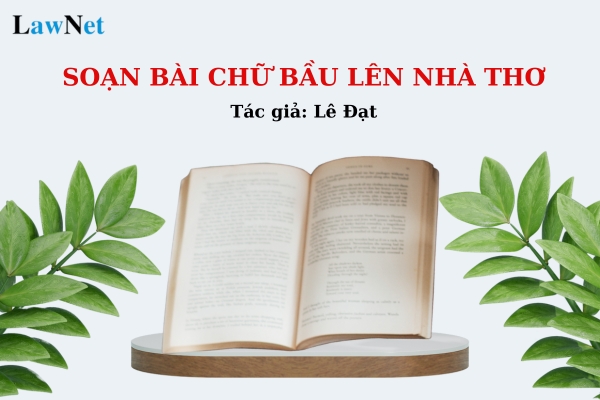Vietnam: What are the guidelines for preparing the shortest lesson "Chữ bầu lên nhà thơ"? What are the orientations to the educational content of Literature?
What are the guidelines for preparing the shortest lesson "Chữ bầu lên nhà thơ"?
The lesson "Chữ bầu lên nhà thơ" is included in the 10th-grade Literature curriculum.
10th-grade students can refer to the following sample shortest lesson "Chữ bầu lên nhà thơ":
|
Guidelines for preparing the shortest lesson "Chữ bầu lên nhà thơ"
|
Note*: The above sample shortest lesson "Chữ bầu lên nhà thơ" is for reference only.*

What are the guidelines for preparing the shortest lesson "Chữ bầu lên nhà thơ"? What are the orientations to the educational content of Literature? (Image from Internet)
What are the orientations to the educational content of Literature in Vietnam?
Under Section V of the General Education Program issued with Circular 32/2018/TT-BGDDT, the orientations to the educational content of Literature in Vietnam are as follows:
- Literature is a compulsory subject from grades 1 to 12. At the primary level, the subject is named the Vietnamese language, and at the lower secondary and upper secondary levels, it is named Literature. The core content includes basic, essential knowledge and skills in Vietnamese and literature, meeting the requirements for quality and competency of students at each academic level; divided into two phases: the fundamental education phase and the Career Orientation education phase.
- Fundamental Education Phase
+ The Literature (Vietnamese) helps students use Vietnamese proficiently for effective communication in life and good learning in other subjects and educational activities; fosters and develops literary competence, an expression of aesthetic capability; and nurtures thoughts and emotions for students to develop in soul and personality.
+ The program is designed with main strands corresponding to the skills of reading, writing, speaking, and listening. Vietnamese and literary knowledge is integrated into the teaching of reading, writing, speaking, and listening. Materials are chosen and arranged according to students' receptive capabilities at each educational level.
- Career Orientation Education Phase
+ The Literature consolidates the content strands of the fundamental education phase, helping students enhance language and literary competencies, especially in literary text reception; strengthens the ability to create argumentative texts and information texts of greater content and technical complexity; and provides some literary history and theory knowledge useful for reading and writing about literature.
+ In each academic year, students with a social sciences and humanities orientation choose to study some specialized topics. These topics aim to increase knowledge of literature and language, the ability to apply knowledge practically, and meet the interests, needs, and Career Orientation of students.
What are the general objectives of the General Education Program for Literature in Vietnam?
Under Section III of the General Education Program for Literature issued with Circular 32/2018/TT-BGDDT, the general objectives of the General Education Program for Literature in Vietnam are as follows:
- To form and develop in students essential qualities: patriotism, compassion, diligence, honesty, and responsibility; to nourish the soul, form personality, and develop individuality.
- To help students discover themselves and the world around them, understand people, have a rich spiritual life, have humanistic views on life and behavior; to foster a love for Vietnamese language and literature; awareness of the origin and identity of the nation, contributing to preserving and developing Vietnamese cultural values; to promote the reception of human cultural quintessence and international integration ability.
- To help students develop general competencies: self-management and self-learning, communication and cooperation, problem-solving, and creativity.
- To help students develop language and literary competencies: training skills in reading, writing, speaking, and listening; to provide a fundamental system of common knowledge about Vietnamese language and literature, developing figurative and logical thinking.
- To contribute to forming the basic education of a cultured person; to know how to create common texts; to receive and evaluate literary texts in particular, communicative products, and aesthetic values in general in life.

